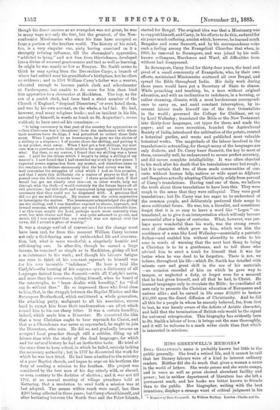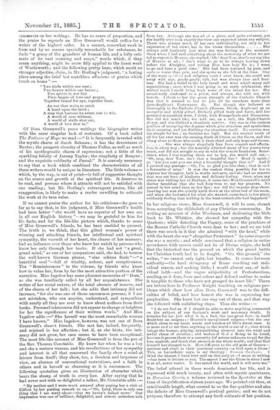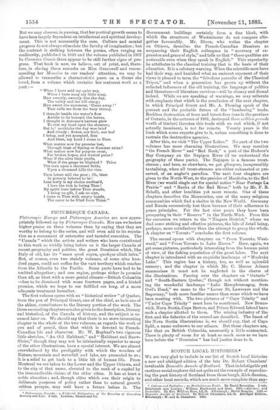MISS GREENWELL'S MEMOIRS.*
DORA GREENWELL'S name is probably known but little to the public generally. She lived a retired life, and it cannot be said that her literary labours were of a kind to interest ordinary readers. Neither did she do much that gives a woman a name in the world of letters. She wrote poems and she wrote essays, and in verse as well as prose showed abundant facility and power ; but in neither department of literature has she left a permanent mark, and her books are better known to friends than to the public. Her biographer, writing with the best intentions, displays a strange want of critical judgment in his Memoirs of Dora Greenuell. By William Dorling. London : Clarke and Co.
comments on her writings. He has no sense of proportion, and the praise he expends on Miss Greenwell would suffice for a writer of the highest order. In a sonnet, somewhat weak in form and by no means specially remarkable for substance, he finds " a grasp of the grandeur of human life, and a lofty esti- mate of its vast meaning and scope," words which, if they mean anything, might be more fitly applied to the finest work of Wordsworth ; and the following pretty lines, which merit no stronger adjective, claim, in Mr. Dorling's judgment, "a lasting place among the brief but matchless effusions of genius which touch on home " :—
" Two birds within one nest ;
Two hearts within one breast ; Two spirits in one fair
Firm league of love and prayer,
Together bound for aye, together blest.
An ear that waits to catch A hand upon the latch ;
A step that hastens its sweet rest to win.
A world of care without, A world of strife shut out,
A world of love shut in."
Of Dora Greenwell's prose writings the biographer writes with the same singular lack of restraint. Of a book called The Patience of Hope we read :—" It is frequently invested with
the mystic charm of Jacob Behmen ; it has the devoutness of Baxter ; the pungent vivacity of Thomas Fuller, as well as much of his apotbegmatic charm of expression; not a little of the sparkling felicity of Jeremy Taylor ; the simplicity of Bunyan ; and the exquisite sublimity of Pascal." It is scarcely necessary to say that a book which combined the characteristics of all these writers would be unique in literature. The little volume— which, by the way, is out of print—is full of suggestive thought on the source and growth of the spiritual life. It deserves to be read, and persons whom it attracts will not be satisfied with one reading ; but Mr. Dorling's extravagant praise, like all exaggeration, is likely to make a reader unwilling to estimate the work at its true value.
If we cannot praise the author for his criticisms—he goes so far as to say that, in his judgment, if Miss Greenwell's health had been better "she would have no superior of her own sex _ in all our English history "—we may be grateful to him for his facts, and for the life-like picture which, thanks to some of Miss Greenwell's friends, he has been enabled to present. The truth is, we think, that this gifted woman's power of winning and attaching friends, her intellectual and spiritual sympathy, the warmth of her heart, the charm of her manners, had an influence over those who knew her unfelt by persons who know her only through her books. If she had not " a great, grand mind," as one of her companions said, she had, to borrow the well-known German phrase, " eine schone Seele "—" a beautiful soul "—full of vitality, ardour, and receptiveness. The " Reminiscences " in the volume, by friends who knew how to value her, form by far the most attractive portion of the narrative. Miss Ingelow has some pleasant memories of " Dora,"
as she was familiarly called by all her acquaintances. She
writes of her social nature, of the total absence of reserve, and of the charm of her talk ; but she adds that intimacy did not increase, "for she was one of those uncommon persons, if I am not mistaken, who can acquire, understand, and sympathise with nearly all they are ever to know about authors from their books. Personal intercourse did not appear to change or heighten for her the significance of their written words." And Miss Ingelow adds :—" She herself was the most remarkable woman I have known." Miss Ingelow, however, was not one of Dora Greenwell's closest friends. She met her, indeed, frequently,
and rejoiced in her affection ; but if, as she hints, the inti- macy did not grow, her case seems to have been exceptional.
The most life-like account of Miss Greenwell is from the pen of the Rev. Thomas Constable. He knew her when he was a boy and she a mature woman, and his recollections of her sympathy and interest in all that concerned the family show a mind at leisure from itself; they show, too, a freedom and largeness of view, an absence of conventional restrictions, and a faith in others and in herself as charming as it is uncommon. The following quotation gives an illustration of character which bears the stamp of truth in every line. After saying that be had never met with so delightful a talker, Mr. Constable adds :—
" My mother and I were much amused after paying her a visit at Clifton by her parting remark to us,—` Oh, Lucy, there is only one thing that I am sorry about—that we haven't talked more.' Oar impression was one of brilliant, delightful, and almost unbroken talk
from her. Although she was all of a piece, and quite coherent, yet she hardly ever took exactly the view one expected about any subject. There was always much of her own individuality, not only in her
expression of her views, but in the views themselves She always said fearlessly just what she was feeling at the moment. Once when I had said something about the monotony of what we are led to expect in Heaven, she replied, • Oh ! dear Tom, that's not my idea of Heaven at all ; I don't want to go to be always bowing down before the Almighty, and telling Him how holy He is; I want to go and have a good time.' She had been tortured by pain, and malaise worse than pain, and she spoke as she felt at the time. One of the most spirituel and religions souls I ever knew, she could not away with any, goody-goody, talk, but was always true and fear- less. She had a belief in the holy bread and wine which many call superstitious ; once, when I was going to an early celebration, she wished much I could bring back some of the bread for her. She occasionally confessed to a priest, and always, she told me, with benefit. I think to her the great strength of the Catholic Church was that it seemed to her to join all its members more than (non-Anglican) Protestants do. But though she believed so thoroughly in the Catholic Church (Roman, Greek, Anglican) as an energetic and richly gifted, Divinely gifted body and force, still her personal sympathies were, I think, with Evangelicals and Dissenters. She did not much like, she told me, as a rule, the High-Church clergy, and she disliked a ritualistic service. Ehe was in the curious position of accepting the dogmas which give ritualism and symbolism their meaning, and yet disliking the ritualism itself. No service was too simple for her ; no doctrine too high. But the central truth of all for her ever was the atoning death of Christ on the Cross, and she clung alone to those who made it their chief and only hope and theme.
She was always singularly free from conceit and affecta- tion in every way ; but she honestly admired many of her poems very much, and did not scruple to say so with the utmost frankness. Some- times, when I was reading them out to her, she would call out,- ' Oh, stop, dear Tom, isn't that a beautiful line ? Read it again ;' or, ' Are you sure you see what a beautiful thought that is ?' And if I praised any passage—' Oh, I'm so glad you like that ; that is such a favourite of mine.' It was the easiest thing possible for her to express her thoughts, both in words and acts, and she had no reserve that was not born of kindness and delicate feeling. Once, when my sister was visiting her at Durham, it came into Miss Greenwell'a mind during breakfast that she had forgotten to say her prayers. No sooner in her mind than on her lips ; nor did the impulse atop there. Leaving her seat she quietly knelt down at the other end of the room, and when she had asked for what she wanted, came back to her place, evidently feeling that nothing in the least remarkable had happened."
In her religions views, Miss Greenwell, it will be seen, shrank from accepting the shibboleth of any Christian community. In writing an account of John Woolman, and dedicating the little book to Mr. Whittier, she showed her sympathy with the Quakers ; while detesting the Papacy, some of the practices of the Roman Catholic Church were dear to her ; and we are told there was much in it that she admired "with the head," while with the heart she was" altogether Protestant." In some respects she was a mystic ; and while convinced that a religion in entire accordance with reason could not be of Divine origin, she held that the historical was the ground on which the grand battle for Christian truth had to be fought. " On this ground," she writes, " we cannot only fight, but breathe. It comes between authority—the hard stringency of Rome crushing out indi- vidual reason, and making little, I would almost say, of indi- vidual faith—and the vague subjectivity of Protestantism, needing, as it does, form and colour and defined outline to make it tangible to those who have not grasped its inner life." There are letters here to Professor Knight touching on religious pro- blems which show how alive Dora Greenwell was to the diffi- culties of belief, and how honest she was in expressing her perplexities. She knew but one way out of them, and that way she followed with unfaltering steps. Thus she writes :-
" I do not feel as if I should be able to write anything connected on the subject of our Saviour's work and necessary death. It remains for me jnst what it is, a fact, the one great fact—in itself doubtless an enigma ;—Heaven's unexplained enigma—but the one which alone to my heart meets and touches all life's direst ones. It is more real to me than anything in the world or out of it ; that which brings the human, pitying, sympathising element into the whirl and awful chaos of creation ; and makes of God a Being to be loved, because it proves there is a necessity (of nature unknown to us) for the loss, anguish, and death that presses on the whole world ; and that God himself has stooped to it. How different to the old gods of Greece— careless and cruel in their continual serenity—a God upon a Cross ! This, as Lacordaire says, is my theology : Sununu theolog ice. I think the utmost I have ever said on this subject—I mean in writing —has been in letters to you. The aspect I see the Cross in since I saw it at all, never varies. It has saved the world, and it will save me.'' The belief uttered in these words dominated her life, and is expressed with much beauty, and often with mystic quaintness, in Carolina Crude, a volume reviewed in the Spectator at the time of its publication sixteen years ago. We pointed out then, at considerable length, what seemed to us the fine qualities and also the defects of Miss Greenwell's poetical genius; and we do not purpose, therefore, to attempt any fresh estimate of her position.
But we may observe, in passing, that her poetical growth seems to have been largely dependent on intellectual and spiritual develop. ment. This is not necessarily the case. Culture and mental progress do not always stimulate the faculty of imagination ; but the contrast is striking between the poems, often verging on mediocrity, published in 1848 and the volume published in 1867 In Carmina Cruets there appear to be still further signs of pro- gress. That book is now, we believe, out of print, and, there- fore, in closing these remarks on Miss Greenwell and recom- mending her Memoirs to our readers' attention, we may be allowed to transcribe a characteristic poem on a theme she loved, from a volume which contains her maturest work as a poet :—
" When I have said my quiet say, When I have sung my little song, How sweetly, sweetly dies the day, The valley and the hill along; How sweet the summons, Come away ! '
That calls me from the busy throng.
I thought beside the water's flow Awhile to lie beneath the leaves, I thought in Autumn's harvest glow To rest my head upon the sheaves; But lo! methinks the day wag brief And cloudy ; flower, nor fruit, nor leaf I bring, and yet accepted, free And blest, my Lord I come to Thee.
What matter now for promise lost, Through blast of Spring or Summer rains ?
What matter now for purpose crost, For broken hopes, and wasted pains ? What if the olive little yields, What if the grape be blighted ? Thine The corn upon a thousand fields, Upon a thousand hills the vine.
Thou lovest still the poor ; Oh, blest In poverty beloved to be !
Leas lowly is my choice confessed, I love the rich in loving Thee ! My spirit bare before Thee stands, I bring no gift, I ask no sign, I come to Thee with empty hands, The surer to be filled from Thine."




































 Previous page
Previous page